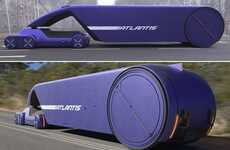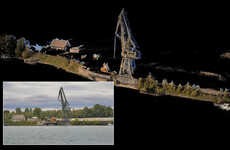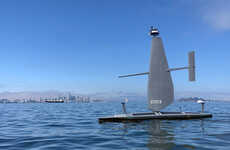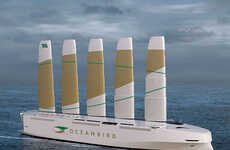
Rolls-Royce is Modernizing Cargo Ships with Intel Tech
Justin Lam — October 16, 2018 — Autos
References: venturebeat & theverge
Rolls-Royce recently announced a new partnership with Intel that will see the development of autonomous cargo ships for use on the high seas. The company -- which is separated from car brands of the same name -- has been focused on autonomous shipping since the early 2010s and will now be using Intel chips to power the autonomous tech onboard the ships.
Fully autonomous ships may not be ready yet, but Rolls-Royce already equipped a ship with its Intelligent Awareness system for some crewed vessels. This system leverages a network of cameras. LIDAR and radar, all of which are overseen by a central program. The program will then utilize machine vision algorithms to search for potential obstacles and relay that information to the crew.
Image Credit: Rolls-Royce
Fully autonomous ships may not be ready yet, but Rolls-Royce already equipped a ship with its Intelligent Awareness system for some crewed vessels. This system leverages a network of cameras. LIDAR and radar, all of which are overseen by a central program. The program will then utilize machine vision algorithms to search for potential obstacles and relay that information to the crew.
Image Credit: Rolls-Royce
Trend Themes
1. Autonomous Cargo Ships - The development of autonomous cargo ships powered by Intel chips presents opportunities for disruptive innovation in the maritime industry.
2. Intelligent Awareness System - The integration of a network of cameras, LIDAR, and radar with machine vision algorithms in the Intelligent Awareness system creates opportunities for disruptive innovation in maritime safety and navigation.
3. Machine Vision Algorithms - The use of machine vision algorithms to detect potential obstacles and relay information to the crew opens doors for disruptive innovation in automation and efficiency in the shipping industry.
Industry Implications
1. Maritime Industry - The adoption of autonomous cargo ships presents disruptive innovation opportunities in terms of increased efficiency and cost-effectiveness in maritime transportation.
2. Technology Industry - The partnership between Rolls-Royce and Intel to develop autonomous cargo ships highlights disruptive innovation opportunities in the field of autonomous technologies and chip manufacturing.
3. Safety and Navigation Industry - The integration of advanced sensor technologies and machine vision algorithms in the Intelligent Awareness system offers disruptive innovation opportunities in enhancing safety and navigation capabilities for crewed vessels.
2.8
Score
Popularity
Activity
Freshness























